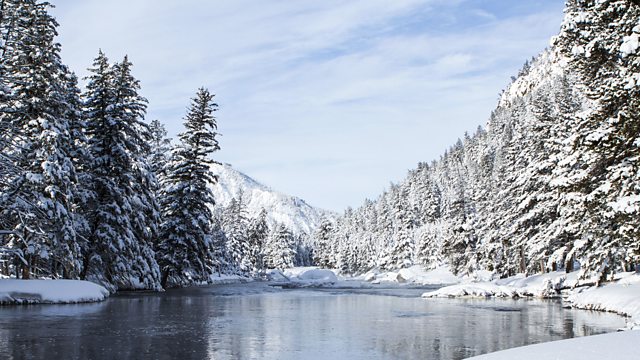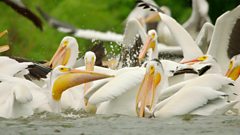
Mississippi
The surprising story of the Mississippi, a river that unites the USA. From frozen waterfalls to time-travelling barges, the Mississippi connects a continent like no other river.
It is an unexpected and contrasting journey through America's iconic and varied landscapes as the Mississippi flows from source to mouth. The Mississippi's greatest surprise is its incredible reach. Its fingers stretch into nearly half of the USA, collecting water from 31 states. More than any other, this one river has helped unite the many and varied parts of America. The Mississippi's longest tributary begins life in the depths of winter, in the towering Rocky Mountains of Wyoming and Montana. Billions of tonnes of water, ultimately destined to flow south are trapped as ice and snow. Here, its headwaters are a draw for the world's top ice climbers, who celebrate winter with daring climbs up towering frozen waterfalls - surely the most dangerous and spectacular winter faces of the ice-bound Mississippi.
In this frozen wilderness, a handful of tenacious coyotes have learned to fish, in one remarkable Mississippi headwater kept flowing by the steaming geysers of Yellowstone National Park. In the bone-chilling water, the coyotes stand stock still for hours, risking severe hypothermia in the hope of pouncing on a fish. Spring in the Upper Mississippi in Minnesota, arrives on the wings of tens of thousands of white pelicans who bring the river to life. Both comical and beautiful, their crowded flotillas put on balletic, synchronised fishing displays. On the other side of the continent in crystal-clear Appalachian Mountain streams, some devious parents employ the creepiest childcare strategy on earth. Freshwater mussels produce bizarre growths which mimic small fish. These lifelike lures even have false eyes and dance, imitating real fish. Their purpose is to act as living bait, tricking larger predatory fish into attacking them. Once bitten, a cloud of blood-sucking baby mussels clamp onto the unwitting fish's gills. After several weeks of feeding on their victim's body fluids, they drop off and disperse. These sneaky mussels provide their babies with food and transport to different parts of the river. It is a macabre underwater puppet show, made all the more weird as the puppet master (the parent mussel) is blind and has no idea what a fish looks like.
But the spring thaw also means extra work for busy beavers - safe in their cosy lodges all winter, they must now venture out to repair the damage that the rushing meltwater has done to their precious dams. As the river flows south through the central US, it becomes a vital transport link. Special cameras take us on a time-travelling journey down the busiest section of the river. A gigantic boat zooms hundreds of miles downriver in seconds, flashing through night and day. This is the industrial heart of the river. Even here, the river still hosts incredible wildlife spectacles. Each Independence Day, millions of mayflies gather in swarms so large they can be seen on weather radar.
As it flows into the south, it spreads and slows, feeding the largest swamp in the US - the fertile, mysterious Atchafalaya. Over 2,000 square miles of wetlands, where alligators still rule. This is one of the richest and most diverse wilderness regions of the states, - a melting pot where racoons and beavers mix with tropical specialties like roseate spoonbills and emerald-green anole lizards. These back waters are the fabled spirit of the Mississippi made famous by Mark Twain and the Blues. As the massive river nears the ocean, it passes cities that have grown up along its banks - like New Orleans. Here 60 miles of docks make it the largest port in the western hemisphere where goods brought down the Mississippi are transferred to huge ocean going ships.
At the end of its 3,500-mile journey, the Mississippi eventually creates one of the biggest river deltas on the planet. But today this delta is under threat. Damming and controls along the river's length are preventing the Mississippi's natural flood cycles - it can no longer replace land that the ocean washes away. This remarkable delta is home to millions of migrant birds and protects vast areas inland from hurricane surges. Its preservation is key to both the people and the wildlife here. The delta is a landscape built by the river from cornfields in Iowa, mountaisides in the Rockies and sediment from Tennessee streams - all collected and deposited by one huge river which unites and defines one great nation.
Last on
More episodes
Previous
Next
You are at the last episode
Clips
-
![]()
American white pelicans flock to Minnesota
Duration: 01:18
-
![]()
Mississippi river barges at night
Duration: 01:53
-
![]()
Reddish egrets feeding in Louisiana
Duration: 01:36
-
![]()
Baby Alligators in Atchafalaya Swamp
Duration: 01:54
Music Played
-
![]()
Gioachino Rossini
The Barber of Seville (Overture)
Credits
| Role | Contributor |
|---|---|
| Narrator | David Oyelowo |
| Series Producer | Mark Flowers |
| Executive Producer | James Honeyborne |
| Executive Producer | Roger Webb |
| Production Manager | Gillian Goodlet |
| Producer | Simon Blakeney |
Broadcasts
- Thu 3 Jan 2019 21:00
- Wed 9 Jan 2019 23:15麻豆官网首页入口 Two except Wales & Wales HD
- Wed 9 Jan 2019 23:45麻豆官网首页入口 Two Wales & Wales HD only
- Wed 6 Feb 2019 01:15
- Wed 17 Jul 2019 19:00麻豆官网首页入口 Two except Scotland
- Wed 22 Jan 2020 20:00
- Thu 23 Jan 2020 03:00
- Tue 6 Oct 2020 20:00
- Mon 12 Oct 2020 02:40
- Sat 20 Mar 2021 16:00麻豆官网首页入口 Two except Northern Ireland, Scotland & Northern Ireland HD
- Wed 8 Sep 2021 20:00
- Thu 9 Sep 2021 02:00
- Sun 12 Sep 2021 02:05
- Wed 12 Apr 2023 14:45麻豆官网首页入口 Two except Scotland
- Thu 13 Jun 2024 19:00麻豆官网首页入口 Two except Scotland, Wales & Wales HD





